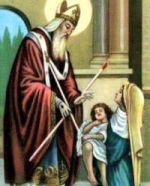'We Always Thank God!'
1. We have just heard the wonderful Christological hymn of the Letter to the Colossians. The Liturgy of Vespers presents it in all four weeks in which the liturgy unfolds and offers it to the faithful as a Canticle, returning the text to what was perhaps its original form. Indeed, many scholars think that the Canticle might be a citation from a hymn of the Church in Asia Minor, which Paul inserted into the Letter he addressed to the Christian community of Colossae, then a flourishing and densely populated city.
The Apostle, however, never went to this centre of Phrygia, a region that is now part of Turkey. The local Church was founded by one of his disciples who came from the region whose name was Epaphras. He is mentioned briefly at the end of the Letter, together with Luke the Evangelist, "the beloved physician" as St Paul calls him (4: 14), and another figure, Mark, "the cousin of Barnabas" (4: 10), perhaps the same Mark who was the companion of Barnabas and Paul (cf. Acts 12: 25; 13: 5, 13) and later became the Evangelist.
Christ, Lord of the cosmos
2. Since we will have several occasions to return to this Canticle, let us be content here with an overview of it, recalling a spiritual commentary on it by a famous Father of the Church, St John Chrysostom (fourth century A.D.), a noted orator who was also Bishop of Constantinople. The grandiose figure of Christ, Lord of the cosmos, stands out in this hymn. Like divine creative Wisdom, extolled in the Old Testament (cf. for example, Prv 8: 22-31), "he is before all things, and in him all things hold together"; indeed, "all things were created through him and for him" (Col 1: 16, 17).
Thus, a transcendent design unfolds in the universe that God puts into practice through the work of the Son. John also proclaims it in the Prologue to his Gospel when he says: "all things were made through him, and without him was not anything made that was made" (Jn 1: 3). Even matter, with its energy, life and light, bears the imprint of the Word of God, "his beloved Son" (Col 1: 13). The revelation of the New Testament casts new light on the words of the wise man of the Old Testament, who declared that "from the greatness and beauty of created things comes a corresponding perception of their Creator" (Wis 13: 5).
Jesus is the source of true peace
3. The Canticle in the Letter to the Colossians presents another function of Christ: he is also the Lord of the history of salvation who makes himself manifest in the Church (cf. Col 1: 18) and is fulfilled in "the blood of his cross" (v. 20), a source of peace and harmony for the whole of human life.
It is therefore not only our external horizons that are marked by the effective presence of Christ, but also the most specific reality of human creatures: history. It is not at the mercy of blind and irrational forces, but even in sin and evil is supported and guided toward fullness by Christ's action. This is how the whole of reality is "reconciled" with the Father through the Cross of Christ (cf. v. 20).
Thus, the hymn paints a marvellous fresco of the universe and of history, inviting us to trust. We are not useless grains of dust, irrelevantly scattered in space and time, but are part of a wise plan conceived by the Father's love.
All things viewed as gifts of God
4. As we announced, we will now let St John Chrysostom speak so that he may crown this reflection. In his Commentary on the Letter to the Colossians, he reflects extensively on our Canticle. At the beginning, he underlines the gratuitousness of the gift of God "who has qualified us to share in the inheritance of the saints in light" (v. 12). "Why does he say "inheritance'?" Chrysostom asks himself, stating: "To show that no one can attain the Kingdom with his own works. Here too, as it does more often than not, the word "inheritance' means "fortune'. No one's behaviour is such as to deserve the Kingdom, but all things are a gift from the Lord. For this reason, [the Lord] says: "When you have finished doing everything, say: We are useless servants. We have done all that we had to do'" (PG 62: 312).
This kind and powerful free-giving comes to the fore once again when we later read that it is in Christ that all things were created (cf. Col 1: 16). "It is on him that the substance of all things depends", the Bishop explains. "Not only does he make them pass from not existing to existing, but it is again he who supports them so that if they were removed from his providence they would perish and be dispelled.... They depend on him: indeed, turning towards him is enough to sustain and strengthen them" (PG 62: 319).
What Christ accomplishes for the Church, of which he is the Head, is an even clearer sign of his gratuitous love. At this point (cf. v. 18), Chrysostom explains, "After speaking of Christ's dignity, the Apostle also speaks of his love for men and women: "He is the head of his body which is the Church', desiring to demonstrate his intimate communion with us. Indeed, he who is so exalted, who is above all things, unites himself with those who are beneath him" (PG 62: 320).
This item 5971 digitally provided courtesy of CatholicCulture.org






